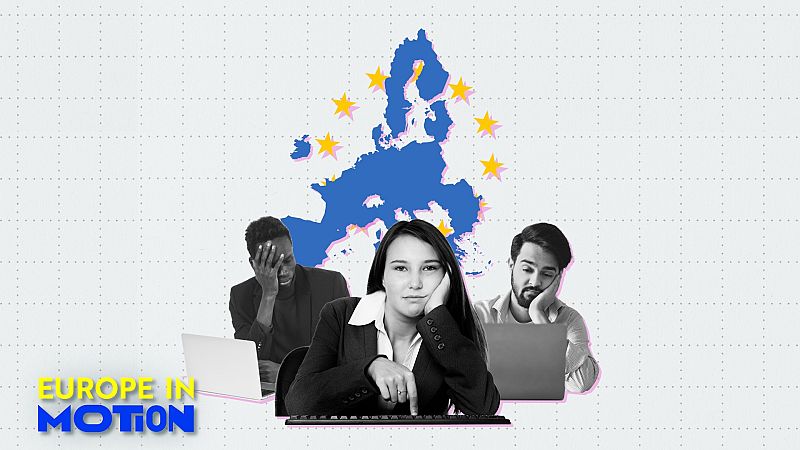Watch the video: Where in the EU are people working long hours?

Summer is coming to an end, and offices are filling up again across Europe, with people swapping holidays for work.
However, a significant share of Europeans will be putting in much more time at work.
Figures from Eurostat showed that 6.6% of working people aged 20 to 64 in the EU worked long hours—defined by the EU's statistical office as spending 49 hours or more every week working in a main job— in 2024.
The share of people working long hours has decreased in the EU. In 2019, this figure was still 8.4%, while in 2014 it sat at 9.7%. The highest figure on record was reported in 2005, when 11.7% of people in employment indicated working 49 hours or more per week.
Significant differences per country
Behind this EU-wide figure lie striking national discrepancies.
When only taking into account EU countries, Greece had the highest share of people working long hours, at 12.4%. However, this figure too has dramatically decreased since the turn of the century, when it was almost 20%.
When taking all European countries into account, Iceland ranked number one with 13.6% of people of working age regularly working 49 hours or more per week in 2024. In 2000, this figure was as high as 35%.
Greece was followed by Cyprus (10%) and France (9.9%). The EU top five was rounded out by Portugal and Belgium, with 9.2% and 8.4%, respectively.
The share of people working long hours was higher than the EU average in Austria, Ireland, Italy, Czechia, Poland and Sweden.
By contrast, the smallest share of people saying they work long hours could be found in Bulgaria (0.4%), and in the Baltic countries of Latvia (1.0%) and Lithuania (1.4%).
Higher rates among men, self-employed and managers
The data showed men are more likely to work long hours than women. Across the EU-27, 9.3% of male workers regularly work long hours, compared to 3.6% of women.
The gap between self-employed people and employees is particularly stark.
More than a quarter (27.5%) of all self-employed respondents indicated working such hours, some 24 percentage points more than the 3.4% of all employees doing so.
Among self-employed people with employees (employers), the figure nears 40%.
When it comes to the type of workers toiling away, long working hours were most common among skilled agricultural, forestry and fishery workers. More than a quarter (26.2%) of all employed people in that occupation group worked long hours.
Meanwhile, this figure was one in five (21.2%) among managers.
When it comes to the average hours worked per week, the figure stood at 36 hours last year. Again, there are significant variations between EU countries, from 32.1 actual hours of work in the Netherlands to 39.8 in Greece.
Health effects of working long hours
Even though the share of workers doing long hours is dropping, it remains high, especially considering the known health impact of working significantly more than the average hours per week.
A study led by University College London (UCL) in 2015 indicates that employees working more than 55 hours a week have a 33% increased risk of stroke compared with those who work a 35- to 40-hour week.
Meanwhile, a 2021 report by the World Health Organization and International Labor Organization found that working long hours, defined as more than 55 hours a week, was responsible for 745,000 deaths from stroke and heart disease in 2016. This marked a 29% increase since 2000.
The health effects can be both direct and indirect: The stress associated with working long hours can have a direct impact on your health, while indirectly, it reduces the amount of time people use to engage in healthy activities.
Maximum working hours per week are set out in the European Working Time Directive, which dates back to 2003. This law states that the maximum average working time for employees cannot exceed 48 hours per week, including overtime.
The figures come amid ongoing debates about flexible work arrangements, productivity, and burnout, with some countries eyeing a shorter workweek.
However, some countries are diverging from this trend. Last year, Greece, for example, passed legislation allowing some employers to mandate a six-day workweek.
Today

